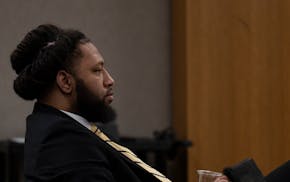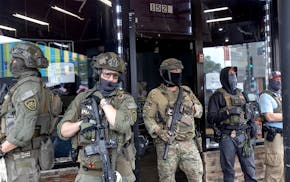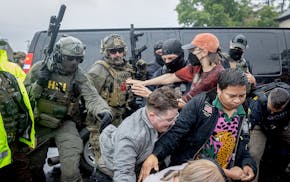The Minnesota Legislature will kick off the 2025 legislative session on Tuesday.
Or maybe not.
Tight margins and historic acrimony between the two parties has cast uncertainty over who's going to be in charge for the next two years and whether legislators can do any business at all pending a pair of special elections slated for late January.
House Democrats say they're considering not showing up to the Capitol next week to prevent Republicans from taking control of the speakership and committees, an extraordinary step that could hinge on how one statewide official determines what constitutes a "quorum" in the chamber.
Here's what you need to know about messy situation in St. Paul and what could happen next:
How did we get here?
Last year, Democrats narrowly controlled both the House and the Senate. In the November election, the party managed to maintain control of the Senate by a single seat but lost several seats in the House, leaving the chamber evenly split 67-67.
However, Republicans successfully challenged the residency status of DFLer Curtis Johnson, who was elected to a Roseville-area House seat in the fall. A Ramsey County judge ruled in December that Johnson didn't live in the district he was elected to represent and couldn't take the oath of office when lawmakers return to the Capitol next week.
Gov. Tim Walz called a special election Jan. 28 to fill the seat — which Democrats are heavily favored to win — but the vacancy gives Republicans a temporary 67-66 edge in the chamber.
So who's in control?
Until the December court order, the two parties had been discussing a power-sharing agreement for session.
Now Republicans say the 67-66 advantage will allow them to elect a speaker and control committees and assignments for the next two years. DFLers disagree, arguing the advantage is only temporary and 68 votes are needed to do anything in the House, including the election of a speaker.
What's happened in the past?
Republicans have cited several other examples of the chamber electing a speaker with 67 votes, most recently former Republican Speaker Steve Sviggum in 2005.
Why are Democrats considering not showing up?
Democrats say the chamber needs 68 out of 134 votes to achieve a "quorum" to transact any business. Absent a power-sharing agreement with Republicans, Democrats say they won't show up on the first day to deny them a quorum and prevent them from electing a speaker or setting committee assignments. With the Roseville seat temporarily vacant, Republicans argue the chamber has 133 members, and 67 is a majority and constitutes a quorum.
Who gets to decide which interpretation is correct?
That ruling could come down to Minnesota Secretary of State Steve Simon, who has the responsibility of helping convene the House on Tuesday as a presiding officer. Simon's office said he met with Republicans Wednesday and told them 68 members are needed for a quorum.
"This determination was made after extensive research, analysis, and consultation with nonpartisan experts," according to a spokeswoman. "Sec. Simon offered the opportunity for the Republican leaders to ask questions and to provide their perspective regarding his authority."
Has this happened before in Minnesota?
The Minnesota House has been tied once before back in 1979. DFLers considered walking out on the first day of session that year as well, but ultimately the two parties managed to broker an 11th-hour power-sharing agreement.
Lawmakers in Minnesota rarely boycott the Capitol to prevent business from being conducted. Back in 1857, when Minnesota was still a territory, one legislator absconded with a bill to move Minnesota's capital from St. Paul to St. Peter. He disappeared for a week with the legislation, returning just as session ended, and thus preventing the relocation of the state's capital city.
Have there been walkouts elsewhere across the country?
Yes, especially as the political landscape becomes increasingly fractured. Walkouts have occurred in Oregon, Texas, Indiana and Wisconsin and other states, although rules vary depending on what constitutes a quorum to conduct business.
In Oregon, walkouts by aggrieved lawmakers are fairly common, according to Jim Moore, a politics professor at Pacific University in Oregon. The longest in state history was staged by Senate Republicans in 2023, lasting about six weeks. GOP minority members were protesting Democratic policies over gun safety, abortion and transgender health care.
The walkouts prompted Oregon voters to adopt a popular ballot measure banning lawmakers with 10 unexcused absences from running for reelection.
But Moore said most of the legislators who engaged in walkouts were reelected, although one disqualified incumbent was replaced by his son, and another by his wife.
"Not much changed because of the walkout rule and absences," he said. "It does make things interesting. It plays well getting publicity."
What about closer to home?
Minnesotans may recall 14 Senate Democrats in Wisconsin who famously absconded to a Chicago hotel in 2011 to protest what they said was anti-union legislation pushed by then-Gov. Scott Walker. Despite the high-profile strategic move, the measure passed anyway.
Are there any rules that can force lawmakers back to St. Paul?
Republicans said they are exploring their options, including using law enforcement. Democrats say they can't compel law enforcement to bring them back to the Capitol because the chamber won't be able to organize without a quorum and elect a sergeant at arms. Republicans are also looking into recalling Democratic legislators if they don't show up. That's a complicated and lengthy process and requires approval of the Minnesota Supreme Court.
Do legislators get paid if they don't show up for session?
Minnesota has a part-time Legislature. Hortman said DFLers would continue to meet with community leaders in their districts even if they don't show up to the Capitol next week and she expects members will collect a paycheck.
Could there be more special elections on the horizon?
Possibly. Republicans say they're considering not seating DFL Rep. Brad Tabke, who won his Shakopee district by 14 votes.
His victory is being contested in court after county elections officials lost 20 absentee ballots in one precinct. Republicans want the court to declare a vacancy for the seat, which would trigger a special election. The judge could rule on the request this week.
What's going on in the state Senate?
Democrats held a narrow, one-vote majority in the state Senate after a special election this fall, but DFL Sen. Kari Dziedzic passed away in December, leaving that chamber also temporarily tied 33-33.
Walz called a special election to fill that seat on Jan. 28. A burglary trial for DFL Sen. Nicole Mitchell also gets underway this month. Depending on how the courts rule, Republicans could move to push her out of the chamber this year, triggering another temporary tie.
Ryan Faircloth and Rochelle Olson contributed to this report.
Walz backs transgender kids in sports as Democrats grapple with debate over bans

Brother says Derrick Thompson was driving in crash that killed 5 Somali women

Masked federal agents now a common sight, including at Minneapolis restaurant raid

1st class passenger's violent outburst at MSP about overhead bin lands her in jail, charges say

